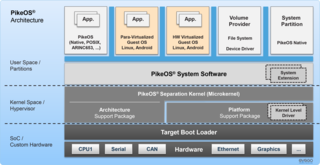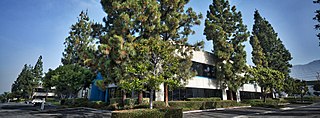In computer science, static program analysis is the analysis of computer programs performed without executing them, in contrast with dynamic program analysis, which is performed on programs during their execution.
IEC 61508 is an international standard published by the International Electrotechnical Commission (IEC) consisting of methods on how to apply, design, deploy and maintain automatic protection systems called safety-related systems. It is titled Functional Safety of Electrical/Electronic/Programmable Electronic Safety-related Systems.
Dynamic program analysis is analysis of computer software that involves executing the program in question. Dynamic program analysis includes familiar techniques from software engineering such as unit testing, debugging, and measuring code coverage, but also includes lesser-known techniques like program slicing and invariant inference. Dynamic program analysis is widely applied in security in the form of runtime memory error detection, fuzzing, dynamic symbolic execution, and taint tracking.

PikeOS is a commercial hard real-time operating system (RTOS) which features a separation kernel-based hypervisor. This hypervisor supports multiple logical partition types for various operating systems (OS) and applications, each referred to as a GuestOS. PikeOS is designed to facilitate the development of certifiable smart devices for the Internet of Things (IoT) by adhering to standards of quality, safety, and security across different industries. In instances where memory management units (MMU) are not present but memory protection units (MPU) are available on controller-based systems, PikeOS for MPU is designed for critical real-time applications and provides up-to-standard safety and security.
MISRA C is a set of software development guidelines for the C programming language developed by The MISRA Consortium. Its aims are to facilitate code safety, security, portability and reliability in the context of embedded systems, specifically those systems programmed in ISO C / C90 / C99.
LDRA Testbed is a set of core static and dynamic analysis engines for both host and embedded software. LDRA Testbed is made by Liverpool Data Research Associates (LDRA). LDRA Testbed provides the means to enforce compliance with coding standards such as MISRA, JSF++ AV, CERT C, CWE and provides visibility of software flaws that might typically pass through the standard build and test process to become latent problems. In addition, test effectiveness feedback is provided through structural coverage analysis reporting facilities, which support the requirements of the DO-178B standard up to and including Level A.

Parasoft is an independent software vendor specializing in automated software testing and application security with headquarters in Monrovia, California. It was founded in 1987 by four graduates of the California Institute of Technology who planned to commercialize the parallel computing software tools they had been working on for the Caltech Cosmic Cube, which was the first working hypercube computer built.
Parasoft DTP is a development testing and software testing analytics solution from Parasoft that acts as a centralized hub for managing software quality and application security. DTP provides traditional software reports from normal software development activities and is also able to aggregate data from various software testing practices to present an overview of the state of the codebase.

LDRA is a provider of software analysis, test, and requirements traceability tools for the Public and Private sectors. It is a pioneer in static and dynamic software analysis.
ISO 26262, titled "Road vehicles – Functional safety", is an international standard for functional safety of electrical and/or electronic systems that are installed in serial production road vehicles, defined by the International Organization for Standardization (ISO) in 2011, and revised in 2018.
TargetLink is a software for automatic code generation, based on a subset of Simulink/Stateflow models, produced by dSPACE GmbH. TargetLink requires an existing MATLAB/Simulink model to work on. TargetLink generates both ANSI-C and production code optimized for specific processors. It also supports the generation of AUTOSAR-compliant code for software components for the automotive sector. The management of all relevant information for code generation takes place in a central data container, called the Data Dictionary.
The ETAS Group is a German company which designs tools for the development of embedded systems for the automotive industry and other sectors of the embedded industry. ETAS is 100-percent subsidiary of Robert Bosch GmbH.
Development testing is a software development process that involves synchronized application of a broad spectrum of defect prevention and detection strategies in order to reduce software development risks, time, and costs.
AbsInt is a software-development tools vendor based in Saarbrücken, Germany. The company was founded in 1998 as a technology spin-off from the Department of Programming Languages and Compiler Construction of Prof. Reinhard Wilhelm at Saarland University. AbsInt specializes in software-verification tools based on abstract interpretation. Its tools are used worldwide by Fortune 500 companies, educational institutions, government agencies and startups.
Automotive Safety Integrity Level (ASIL) is a risk classification scheme defined by the ISO 26262 - Functional Safety for Road Vehicles standard. This is an adaptation of the Safety Integrity Level (SIL) used in IEC 61508 for the automotive industry. This classification helps defining the safety requirements necessary to be in line with the ISO 26262 standard. The ASIL is established by performing a risk analysis of a potential hazard by looking at the Severity, Exposure and Controllability of the vehicle operating scenario. The safety goal for that hazard in turn carries the ASIL requirements.
Cantata++, or simply Cantata in newer versions, is a commercial computer program for dynamic testing, specifically unit testing and integration testing, and code coverage at run time of C and C++ programs. It is developed and sold by QA Systems, and was formerly a product of IPL Information Processing Ltd.
Time-triggered architecture, also known as a time-triggered system, is a computer system that executes one or more sets of tasks according to a pre-determined and set task schedule. Implementation of a TT system will typically involve use of a single interrupt that is linked to the periodic overflow of a timer. This interrupt may drive a task scheduler. The scheduler will—in turn—release the system tasks at predetermined points in time.
CodeSonar is a static code analysis tool from CodeSecure, Inc. CodeSonar is used to find and fix bugs and security vulnerabilities in source and binary code. It performs whole-program, inter-procedural analysis with abstract interpretation on C, C++, C#, Java, as well as x86 and ARM binary executables and libraries. CodeSonar is typically used by teams developing or assessing software to track their quality or security weaknesses. CodeSonar supports Linux, BSD, FreeBSD, NetBSD, MacOS and Windows hosts and embedded operating systems and compilers.




